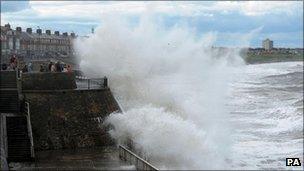Battening down the hatches
- Published
- comments

I was up and about and into what passes for action at an untimely hour this morning, broadcasting to an astonished nation - or at least the enthusiastic portion of said nation sensibly attending to the early section of Good Morning Scotland on the wireless.
Glancing out of the window, I mused upon the weather. A light breeze was idly stirring the leaves, there was a darkening hint of rain to come.
Is that it, I pondered? Where is the hurricane? Was it for this that I battened down the hatches and stowed the garden chairs in the shed? I felt bizarrely cheated.
But then I pondered anew. Worse would undoubtedly come. It was the calm before the storm. (And so it has proved.)
To a certain extent, Scottish politics is in a comparable state. John Swinney is publishing his updated economic strategy with a renewed emphasis upon renewables and green jobs.
But, as my esteemed colleague Douglas Fraser also informed an astonished nation this morning, that is but a prelude for the grander challenge he faces in outlining his budget proposals within the limits set down by Westminster.
Ditto the opposition parties - or, more precisely, Labour and the Conservatives.
The Lib Dems at Holyrood are fairly settled.
Decidedly fewer MSPs than they had bargained for - but a federal party constitution and a newly elected leader in Willie Rennie who has plainly opted to "go for it": to disdain the option of whimpering in a cupboard, choosing instead to offer his views, strongly, on anything and everything.
But, over the weekend, both Labour and the Tories set about the next stages of altering the very shape of their parties and choosing a new leader to replace those who decided that Alex Salmond's overwhelming victory represented a signal to them from the voters.
Intriguingly, both parties are proceeding in the direction of greater autonomy for their Scottish operations - and their Scottish leaders.
In each case - but particularly with regard to Labour, the party which legislated for devolution to Scotland - these developments are somewhat tardy.
Complaints there will be - more of which anon - but both are recognising the reality: that devolved politics requires devolved parties.
We will know the new Labour leader on December 17. You might say that is rather a long delay since Iain Gray quit the day after the Holyrood elections. You would be right.
It reflects guddle and introspection - but also, more charitably, the enforced need to telescope into a few months the party reforms which should have been tackled years ago.
MPs and MEPs will be permitted to stand alongside MSPs for the post of leader - with the proviso that they gain ten nominations from fellow Parliamentarians (including themselves) in at least two chambers and commit to contesting subsequent Holyrood elections in pursuit of the role of first minister.
New captain
We now have a third contender in place for the Labour post, Ken Macintosh, who currently shadows the Education Secretary at Holyrood.
Mr Macintosh says he offers a new voice. Which means, in part, that he is distancing himself from the party's failure at the Holyrood elections.
His rivals as things stand are Johann Lamont, the present deputy leader at Holyrood, and Glasgow MP Tom Harris.
If anything, the Tory debate is more intriguing still. For, even as the reform measures were endorsed at the weekend, the party is facing the prospect of going further still.
One contender for the leadership, Murdo Fraser, says that the party in Scotland requires full autonomy, to present itself as an undiluted Scottish team: admittedly, one which would take the Tory whip at Westminster.
It is not enough, he says, to replace the captain of the ship. One must replace the ship itself.
Bold talk. Courageous stuff. And one can understand the perceived need for this boldness.
If Mr Fraser is to claim a mandate for such an action, then he knows he has to spell out his proposals clearly and firmly.
There can be no room for internal doubt. Nobody saying later: hey, we voted for you - but we didn't expect this.
Logically, fine. If Mr Fraser wins, he is entitled to proclaim support for his radical proposals.
But think. What is the exit strategy if he loses? What does he say and do if Tory members prefer one of his rivals, Jackson Carlaw or Ruth Davidson, who do not support the transformation he proposes?
Does the ship - which he regards as leaking and doomed - then simply sail on contentedly? And does Mr Fraser continue to serve as a senior officer aboard that ship?
More, much more, to come. Pre-tempestuous calm.